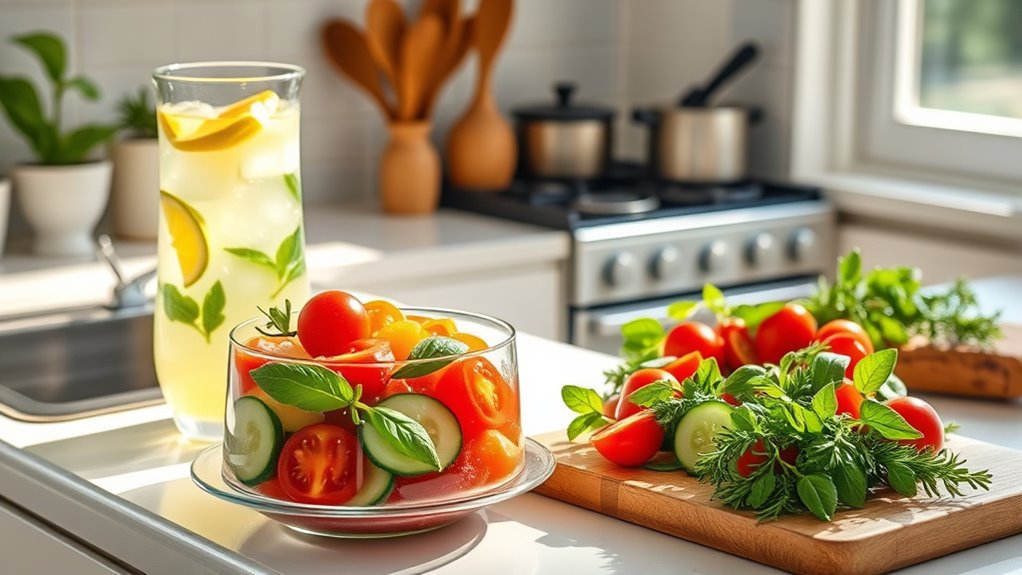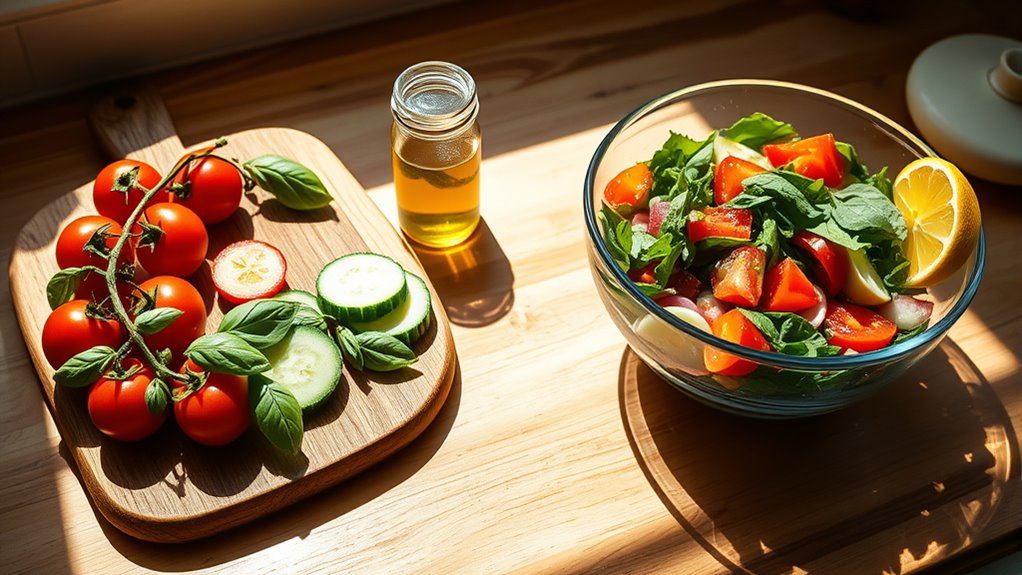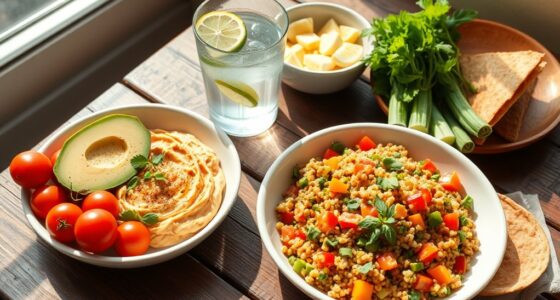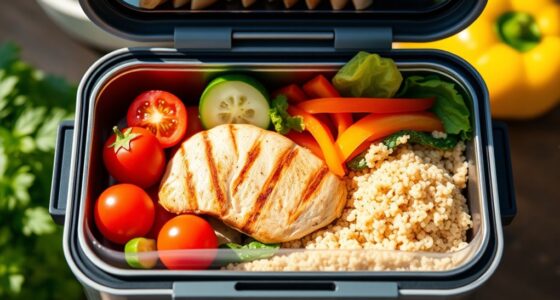In small kitchens, embracing seasonal summer ingredients helps you create fresh, flavorful meals with minimal effort. Use garden herbs like basil, mint, or parsley to elevate simple dishes such as salads, dressings, or grilled veggies. Incorporate in-season fruits like berries, peaches, or watermelon for quick, vibrant salads or snacks. Focusing on peak freshness maximizes flavor and reduces prep time. Keep exploring ideas to make the most of these bright, easy-to-prepare dishes throughout summer.
Key Takeaways
- Focus on quick, minimal equipment recipes like fruit salads and herb-infused dishes for small kitchens.
- Use seasonal summer fruits such as berries, peaches, and watermelon to maximize flavor and freshness.
- Grow and incorporate fresh herbs like basil and mint to elevate simple summer recipes.
- Prepare versatile dishes that can serve as snacks, sides, or light meals, ideal for limited space.
- Leverage peak seasonal ingredients to create vibrant, flavorful meals with minimal prep and storage needs.

Have you ever wondered why seasonal recipes taste so much better? It’s because they’re crafted with ingredients that are at their peak freshness, which amplifies flavor and makes every bite more satisfying. During summer, this means taking advantage of ripe garden herbs and juicy fruit salads to create vibrant, flavorful meals even in small kitchens. With a little planning, you can turn limited space into a culinary playground, making the most of what’s in season. Starting with garden herbs, these fresh additions pack a punch of aroma and taste that instantly elevate simple dishes. Basil, mint, cilantro, and parsley thrive in warm weather and can be grown easily in small pots or window boxes. Incorporate these herbs into your salads, dressings, or even grilled vegetables for a burst of invigorating flavor. Their fragrant oils are at their strongest during summer, so don’t be shy—pound them into pestos or sprinkle them over your dishes to capture that garden-fresh flavor. Additionally, tuning techniques can be employed to optimize the flavor extraction from fresh herbs and ingredients. Fruit salads are the perfect summer snack or side dish, especially in small kitchens where space for elaborate preparations might be limited. The beauty of fruit salads is that they’re quick to assemble, require minimal equipment, and can be customized with seasonal fruits that you can find at local markets or your own backyard. Think juicy watermelons, sweet peaches, tart cherries, and ripe berries—each adding their unique flavor and color. Toss them together with a touch of honey, fresh mint, and a squeeze of lemon or lime for a revitalizing treat that cools you down and satisfies your sweet tooth. These salads are not only easy to prepare but also versatile; you can serve them as a light dessert, a brunch item, or a side for grilled meats. Plus, they don’t take up much space in your fridge or pantry, making them ideal for small kitchens.
Frequently Asked Questions
Can These Recipes Be Adapted for Larger Gatherings?
You can definitely adapt these recipes for larger gatherings by scaling recipes and preparing party-sized portions. Just double or triple the ingredients as needed, ensuring you maintain the correct ratios for flavor and texture. It’s a simple way to serve more guests without sacrificing quality. Keep in mind, using larger cookware or multiple pans can help you cook everything evenly, making your summer feast a hit for everyone.
What Are Quick Prep Tips for Busy Weekdays?
On busy weekdays, you can save time by using meal prep shortcuts like pre-chopped vegetables and pre-cooked grains. Apply quick cooking techniques such as stir-frying, sautéing, or using a pressure cooker to speed up meal preparation. Focus on simple recipes that require minimal steps, and consider batch cooking on weekends to have ready-to-eat ingredients during the week. These strategies make weeknight dinners faster and stress-free.
How to Store Leftovers Safely in Small Kitchens?
To store leftovers safely in small kitchens, focus on proper food safety practices. Use airtight storage containers to prevent contamination and spoilage. Label each container with the date to track freshness. Keep leftovers in the refrigerator within two hours of cooking, and reheat thoroughly before eating. Avoid overcrowding the fridge, which guarantees cold air circulates properly, maintaining safe temperatures. Proper storage helps prevent foodborne illnesses and keeps your meals fresh longer.
Are There Vegan or Gluten-Free Summer Options?
You’re looking for vegan options and gluten-free alternatives for summer meals. You can easily incorporate fresh produce like salads, grilled vegetables, and fruit bowls that suit both dietary needs. Use plant-based proteins such as tofu or beans, and opt for gluten-free grains like quinoa or rice. These options are perfect for small kitchens, quick to prepare, and keep your summer meals fresh, healthy, and inclusive for everyone.
Which Ingredients Are Best for Making Ahead?
Picture your kitchen as a busy beehive, buzzing with meal prep strategies. To make ahead, choose ingredients like roasted veggies, cooked grains, and marinated proteins that hold their flavor and texture. Use ingredient substitutions such as plant-based proteins or gluten-free grains to adapt recipes. These sturdy ingredients act like a well-packed suitcase, ready to be pulled out and enjoyed without fuss, making your summer meals effortless and delicious.
Conclusion
Now, with these fresh summer recipes, your small kitchen transforms into a vibrant garden of flavors. Imagine the sun pouring in, casting a golden glow over your colorful, delicious creations. Embrace the season’s bounty and let your culinary imagination run wild—because even tiny spaces can hold big, beautiful tastes. So go ahead, savor each bite, and turn your summer meals into a feast that feels as bright and lively as the season itself.









